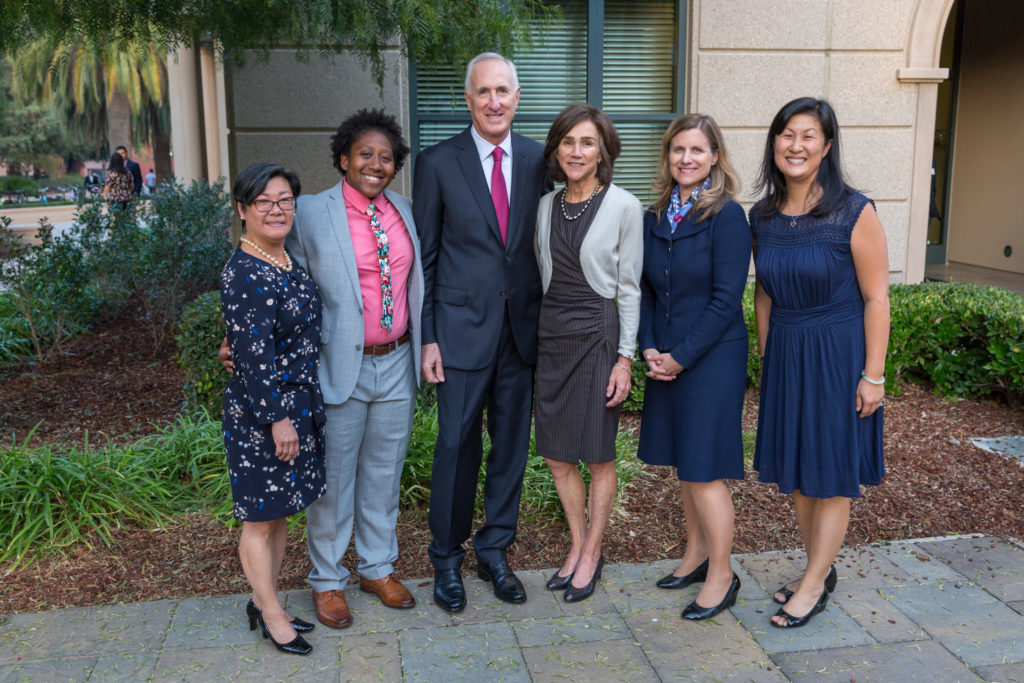The Levin Center: Bringing Public Service to the Fore
IN A 2007 STANFORD LAWYER ARTICLE ANNOUNCING THE LAUNCH of the John and Terry Levin Center for Public Service and Public Interest Law, John Levin, JD ’73 (MA ’70), called public service a professional obligation. “I think the whole notion of law as a profession is bundled up with the fact that it’s about service to others. That’s true of all aspects of law—both public and private,” he said.
Public service has long been a priority at Stanford Law School, but with the founding of the Levin Center in 2007, the school gained a focal point for students, faculty, and alumni to realize their public service aspirations.
“The Levin Center was inspired by a vision—to foster an ethic of service to others in all of our students, no matter their professional path. It was also founded with a pragmatic objective—to supply the advice, mentoring, and tools that will allow Stanford lawyers to turn those commitments into reality. Thanks to terrific leadership in the center and its team, it has succeeded by every measure,” says M. Elizabeth Magill, Richard E. Lang Professor of Law and Dean. “This anniversary is a time to recognize our accomplishments, and renew and refresh our thinking about what more we can do to realize our aspirations.”
The need for public interest lawyers has never been greater. “There are the external reasons—the justice gap, inadequate funding, and the need to represent unpopular clients, communities, and causes so that our democracy will actually function—all of which make pro bono and public service absolutely critical,” says Diane T. Chin, associate dean for public service and public interest law and lecturer in law, who oversees the Levin Center. “Then there are the internal reasons: Every study has shown that lawyers who engage in public service part time or full time have happier and more fulfilling lives.”
In the 10 years since its founding, the Levin Center has steadily increased its impact. Today, it offers financial assistance and career guidance to students and alumni working in public service. The holistic approach taken by the Levin Center sets the public interest program at Stanford Law apart.
“What is so great about the Levin Center is that it integrates a number of functions that used to be separated from each other—employment, advising, and programming,” says Pamela Karlan, the Kenneth and Harle Montgomery Professor of Public Interest Law, who has mentored students interested in public service for decades.
Emma Eastwood-Paticchio, JD ’19, came to SLS intending to practice public interest law and has taken full advantage of the Levin Center’s offerings.
“I began by volunteering for the Levin Center’s pro bono housing project, but I really was interested in gender-based violence,” she says.
“Getting to see firsthand how each of these legal strategies helped women and girls overcome sex discrimination in different ways was invaluable.”
––Emma Eastwood-Paticchio, JD ’19
So, during her 1L year she and several of her friends founded a partner organization and created a new pro bono project addressing those issues. The project will launch this fall and Eastwood-Paticchio will be one of the student leaders. “Right from the beginning, the Levin Center supported me in reaching my goals,” she says. The Levin Center also supported her job search, with individual counseling and the suggestion that she apply to Equal Rights Advocates in San Francisco, where she spent her 1L summer, funded by a center grant. “I focused on workplace discrimination, primarily against women,” she says, “and did legislative advocacy, direct services, and litigation-related work. Getting to see firsthand how each of these legal strategies helped women and girls overcome sex discrimination in different ways was invaluable.”

But the Levin Center is not just for students like Eastwood-Paticchio. It has made a priority of integrating public service into life at the law school, says the executive director, Anna Wang. “We want all students, not just those who are already committed to a career in public interest law, to recognize that public service is part of the SLS experience and carry that commitment with them to their careers after graduation.”
In addition to providing one-on-one counseling and sponsoring panels, guest lectures, and lunches with public interest professionals, one significant way in which the Levin Center achieves this goal is through pro bono projects. Headed by Michael Winn, director of Pro Bono and Externship Programs and a lecturer in law, this program engaged 85 percent of the 2018 entering class in one of its 16 partnerships with pro bono legal organizations. And students who start their time at Stanford doing pro bono work stick with it. Last year, half of the graduating JD students put in enough pro bono hours to graduate with pro bono distinction, and this year interest is just as strong.
“Importantly, 2L and 3L students lead these projects,” says Winn. This is an organic way for them to learn about these systems and is especially helpful for graduates who end up in the private sector and want to coordinate their own pro bono work.”
The Levin Center also provides funding for students and graduates to pursue their public interest careers. “About 115 first-year students get $5,800 for their first summer, and another 25 or so second-year students doing their second summer of public interest get $7,500,” explains Wang. The center also funds 10 postgraduate fellows, each of whom receives a $45,000 salary and $15,000 in benefits. In recent years, fellowships have become an almost indispensable stepping stone to more permanent public interest jobs with nonprofits. “Without this support, some of our graduates would face challenges to launching their public service careers given the realities of the entry-level public interest job market,” she notes.
Center grants funded Elliot Higgins, JD ’18, for two summers, first at the Manhattan District Attorney’s Office and then for a 2L summer split at the EPA and Landesa, a Seattle NGO that addresses land rights issues in the developing world. Higgins, who will serve as a 3L public interest fellow mentoring other students, is also applying for a Levin Center postgraduate fellowship.

“The financial support has made it possible for me to pursue a career in public interest,” he says. “And I’ve been amazed by the unparalleled level of non-financial support from the Levin Center staff and faculty members who have offered in-depth and concrete advice.”
A key aim of the center is to be a one-stop, lifelong operation—and alumni do come back to share their experiences with students as well as for career advice, particularly in regard to the transition into public interest work after clerking or working in private practice.
After about a year and a half working at a firm, Cindy Liou, JD ’07, was ready for a change. “I came to law school wanting to do something in the public interest field, but didn’t quite know how to reorient and transition my career from private intellectual property litigation back to social justice work.” She reached out to Wang, who suggested that she set up an informational interview and connect with practitioners whom she had met through her time in the Stanford Immigrants’ Rights Clinic. That led to the first of several positions in public interest.
Liou, now the deputy director of Legal Services for Kids in Need of Defense, is currently involved in the center’s Leadership Pipeline and Sustainability Pilot Program, which was launched to help alumni working in the nonprofit world to develop skills necessary for senior management positions.
And Chin says the center is working with many more students and alums each year. “We are here for any conversation you want to have. It’s not just about career counseling but also about preparing our students and alumni to succeed in service regardless of the location of their primary job.” She adds, “Current events have definitely increased discussions about how to stay active in public service and we have lots of good ideas to offer.” SL
